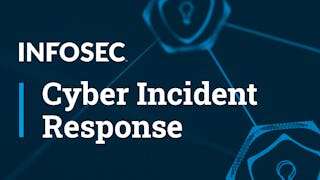This IBM course will teach you the critical skills needed to manage and investigate cybersecurity incidents. You will learn about key topics, including incident response frameworks (NIST and SANS), digital forensics methodologies, and best practices for handling digital evidence. Through hands-on labs and projects, you’ll gain practical experience in detecting, analyzing, and mitigating cybersecurity threats, as well as conducting forensic investigations using industry-standard tools.


Incident Response and Digital Forensics
This course is part of multiple programs.


Instructors: IBM Skills Network Team
77,856 already enrolled
Included with
(1,900 reviews)
Recommended experience
What you'll learn
Explain the principles and importance of incident response in cybersecurity.
Implement techniques for detecting and analyzing security incidents.
Implement methods for collecting and examining digital data.
Analyze and report digital forensic findings to support cybersecurity efforts.
Skills you'll gain
Details to know

Add to your LinkedIn profile
See how employees at top companies are mastering in-demand skills

Build your subject-matter expertise
- Learn new concepts from industry experts
- Gain a foundational understanding of a subject or tool
- Develop job-relevant skills with hands-on projects
- Earn a shareable career certificate

There are 3 modules in this course
This module focuses on the concept and importance of incident response. You’ll learn about the key preparatory steps for incident response and the importance of thorough documentation throughout the incident response process. You will delve into detection and analysis techniques used to identify and understand security incidents, followed by containment, eradication, and recovery strategies to prevent further damage and restore systems. The module also highlights the tools and automation technologies that enhance response efforts and covers post-incident activities. By the end of this module, you will be well-equipped to manage and mitigate security incidents effectively.
What's included
6 videos2 readings2 assignments6 plugins
This module explores the essential aspects of digital forensics and investigation. It provides an overview of digital forensics and highlights its importance in investigating cyber incidents. You'll learn the data collection and examination methods, including using Cowrie for log investigation. The module covers key topics about handling digital evidence to ensure integrity, analyzing and reporting findings, and understanding forensic data files. The module introduces various digital forensics tools and includes practical activities to apply knowledge in simulated investigations. Additionally, it covers the factors influencing data recovery. By the end of this module, you will be able to conduct thorough digital forensic investigations.
What's included
4 videos1 reading2 assignments1 app item4 plugins
What's included
1 video3 readings1 peer review3 plugins
Earn a career certificate
Add this credential to your LinkedIn profile, resume, or CV. Share it on social media and in your performance review.
Offered by
Explore more from Security
 Status: Free Trial
Status: Free Trial Status: Free Trial
Status: Free Trial Status: Free Trial
Status: Free TrialInfosec
 Status: Preview
Status: PreviewStarweaver
Why people choose Coursera for their career




Learner reviews
1,900 reviews
- 5 stars
80.26%
- 4 stars
15.05%
- 3 stars
3.10%
- 2 stars
0.84%
- 1 star
0.73%
Showing 3 of 1900
Reviewed on Jul 10, 2020
This course ought to have come first to provide a context for each concepts presented in previous courses. It really provided more clarity on the whole field of Cyber Security.
Reviewed on Jul 19, 2022
The Course is great and the lecture videos were well organised. I also wish to thank IBM and Coursera for availing us of the links to labs for more detailed learning
Reviewed on Aug 17, 2025
coursera bersama IBM memberikan materi insiden dan forensik Digital dengan pengalaman profesional dunia industri teknologi infomasi

Open new doors with Coursera Plus
Unlimited access to 10,000+ world-class courses, hands-on projects, and job-ready certificate programs - all included in your subscription
Advance your career with an online degree
Earn a degree from world-class universities - 100% online
Join over 3,400 global companies that choose Coursera for Business
Upskill your employees to excel in the digital economy
Frequently asked questions
In this course, you’ll gain hands-on experience with tools such as Cowrie for log investigation and other digital forensic tools essential for conducting cyber incident investigations.
This course provides essential skills in incident response and digital forensics, preparing you for roles such as security analyst, incident response specialist, or digital forensics investigator.
Yes, the course is designed for learners with basic cybersecurity knowledge, but no prior forensics experience is required. The labs and projects will provide you with practical skills from the ground up.
More questions
Financial aid available,
¹ Some assignments in this course are AI-graded. For these assignments, your data will be used in accordance with Coursera's Privacy Notice.

